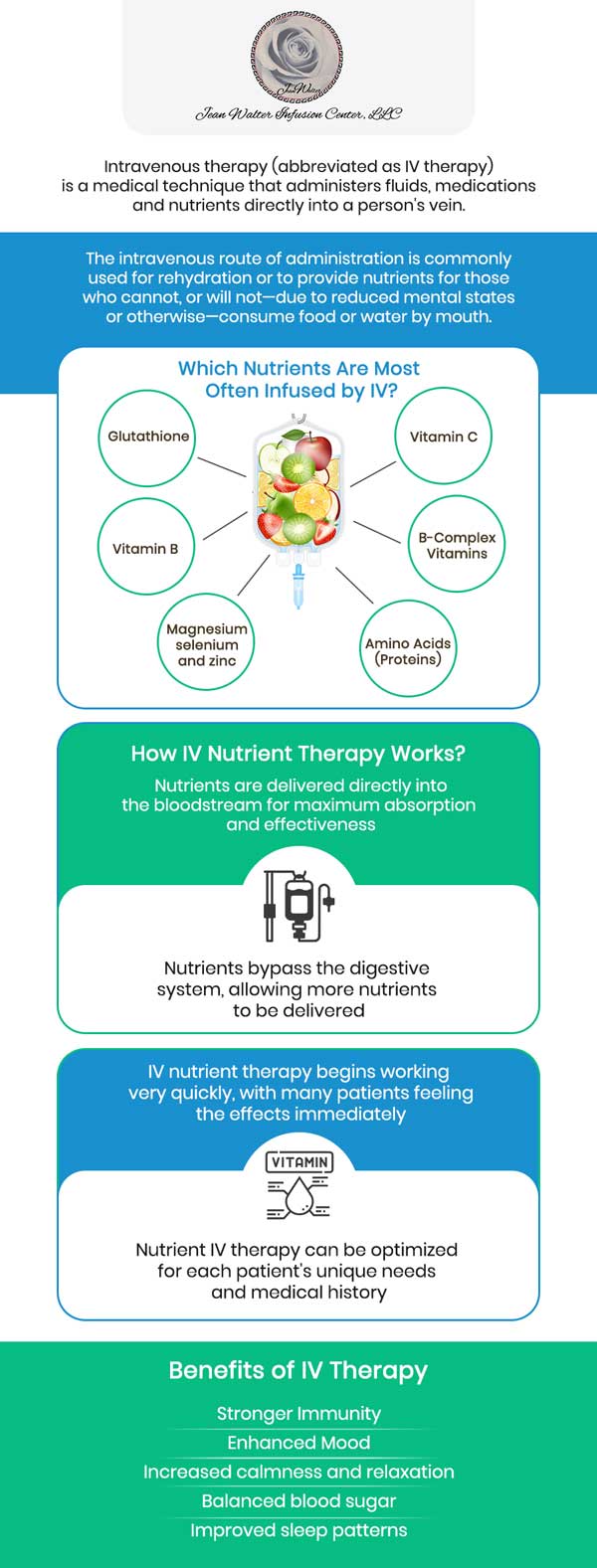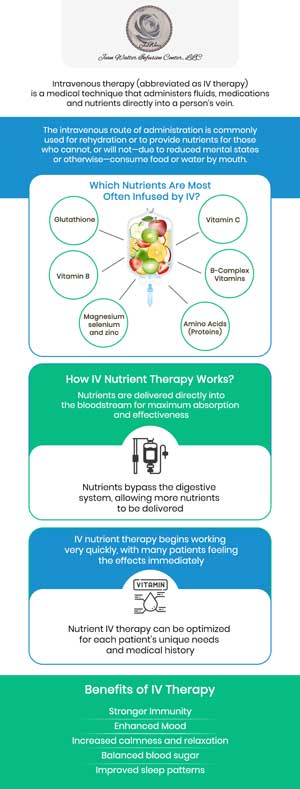How Often Should You Do IV Therapy?
IV therapy, or intravenous therapy, is a common medical procedure that involves the administration of fluids, medications, or nutrients directly into the bloodstream. It is often used to treat a variety of conditions and provide immediate relief to patients. IV therapy is one of the most appealing wellness treatments as it refreshes your body with fluids and nutrients, increases energy levels, slows the effects of aging, improves muscle recovery, and boosts stamina. Dr. Nasser Nasseri, MD, and his team provide IV therapy at Jean Walter Infusion Center. For more information, contact us or book an appointment online. We have convenient locations to serve you in Edgewater MD, Rosedale MD, North Baltimore MD, Columbia MD, Glen Burnie MD, and Catonsville MD.




Table of Contents:
How long does IV therapy last in your body?
Is it safe to get an IV every week?
How long does it take to feel the effects of an IV vitamin infusion?
How do I know if I need an IV for dehydration?
How Often Should You Consider IV Therapy With Dr. Nasseri, MD?
The infusion usually remains in the body for several hours after it is absorbed. However, the fluid’s nutrients, minerals, and medicines can stay in your body for days, weeks, or even months. A lot depends on what your body needs and the type of IV fluids you receive.
The fluids given during IV therapy can last for several hours, but the vitamins can remain in your body for days to weeks. Give your body the full vitamin recommendation every two weeks.
By regularly receiving IV vitamin infusions, individuals can experience improved overall health and a reduced risk of chronic diseases. The infusion of key vitamins and minerals directly into the bloodstream can help address nutrient deficiencies that can contribute to the development of chronic diseases.
When undergoing an IV vitamin infusion, individuals often report an immediate surge in energy and vitality. This can be attributed to the direct delivery of essential nutrients to the body, bypassing the digestive system’s absorption process. By infusing vitamins and minerals directly into the bloodstream, the body can quickly utilize these nutrients, resulting in a noticeable increase in energy levels. Furthermore, IV vitamin infusion therapy has been found to improve mental clarity and focus. Many individuals who receive this treatment report enhanced cognitive function, increased concentration, and improved memory. This can be attributed to the replenishment of key vitamins and minerals that play a crucial role in brain function, such as B vitamins and magnesium. In addition to the boost in energy and mental clarity, IV vitamin infusion therapy also provides hydration and replenishment of essential nutrients. This is particularly beneficial for individuals who may be dehydrated or lacking in certain vitamins and minerals due to poor dietary choices or illness. By directly infusing these nutrients into the bloodstream, the body can quickly absorb and utilize them, resulting in improved overall hydration and nutrient balance.
One of the key short-term benefits of IV vitamin infusion therapy is its ability to boost the immune system and increase resistance to illness. The infusion of vitamins and minerals directly into the bloodstream provides a rapid and efficient way to strengthen the body’s natural defense mechanisms. This can help individuals ward off common illnesses such as colds and flu, as well as reduce the severity and duration of symptoms when they do occur. Moreover, IV vitamin infusion therapy has been shown to enhance recovery from physical exertion or illness. Athletes have reported faster recovery times and reduced muscle soreness after receiving IV vitamin infusions. This can be attributed to the replenishment of key nutrients that aid in tissue repair and reduce inflammation, such as vitamin C and zinc. Another notable short-term effect of IV vitamin infusion therapy is its impact on skin health. Many individuals who undergo this treatment report improved skin complexion and radiance. This can be attributed to the infusion of vitamins and minerals that promote collagen production, reduce oxidative stress, and improve overall skin health. As a result, individuals often experience a youthful glow and improved skin texture.
Dehydration is a condition that occurs when the body loses more fluid than it takes in. It can be caused by various factors such as excessive sweating, vomiting, diarrhea, or simply not drinking enough fluids. While mild dehydration can often be treated with oral rehydration solutions, there are instances where intravenous (IV) fluids are necessary.
A dry mouth and lips are the most noticeable physical signs of dehydration. When the body lacks sufficient fluids, it reduces saliva production, resulting in a parched sensation in the mouth and cracked lips. Additionally, sunken eyes are a telltale sign of dehydration. To conserve water, the body pulls fluid away from the tissues surrounding the eyes, causing them to appear hollow and sunken. Another physical indicator is decreased urine output. In severe cases of dehydration, the body conserves water by reducing urine production, leading to infrequent or dark-colored urine.
Fatigue and weakness are common behavioral signs of dehydration. When the body is dehydrated, it lacks the necessary fluids to carry out its normal functions, resulting in feelings of exhaustion and weakness. Irritability and confusion are also behavioral signs that may indicate the need for IV fluids. Dehydration affects the brain’s ability to function properly, leading to changes in mood and cognition. Furthermore, dizziness and light-headedness can be attributed to dehydration. When the body is dehydrated, blood volume decreases, which can cause a drop in blood pressure and result in feelings of dizziness or even fainting.
Headache and muscle cramps are additional symptoms that may indicate the need for IV fluids. Dehydration can lead to electrolyte imbalances, causing headaches and muscle cramps. Nausea and vomiting can also occur as a result of dehydration. When the body lacks adequate fluids, the digestive system may become irritated, leading to feelings of nausea and the urge to vomit. In severe cases of dehydration, fainting or loss of consciousness can occur. This serious complication requires immediate medical attention and IV fluids to restore hydration levels.
How Often Should You Consider IV Therapy With Dr. Nasseri, MD?
At Jean Walter Infusion Center, led by Dr. Nasser Nasseri, MD, the frequency of IV therapy is tailored to each patient’s unique health needs and wellness goals rather than a one‑size‑fits‑all schedule. IV therapy delivers essential fluids, vitamins, minerals, and nutrients directly into the bloodstream, offering faster absorption and more immediate benefits than oral supplements.
For many patients seeking to maintain energy levels, immune support, or overall wellness, sessions are often recommended every two to four weeks. This timing helps sustain a steady supply of vital nutrients since the benefits can last from a few days up to a couple of weeks, depending on individual metabolism and the specific IV formula used.
Dr. Nasseri and his team emphasize personalized care, meaning the ideal frequency may vary based on factors such as health status, lifestyle, or specific deficiencies. Regular consultations and evaluations ensure your IV therapy plan evolves with your needs for optimal safety and effectiveness.
IV therapy is a safe method to deliver nutrients, vitamins, and medications to the body. You can get it every other week at the Jean Walter Infusion Center. For more information, contact us or book an appointment online. We have convenient locations to serve you in Edgewater MD, Rosedale MD, North Baltimore MD, Columbia MD, Glen Burnie MD, and Catonsville MD. We serve patients from Rosedale MD, Edgewater MD, Columbia MD, Glen Burnie MD, Catonsville MD, North Baltimore, Parkville MD, Middle River MD, Dundalk MD, Halethrope MD, Ellicott City MD, Laurel MD, Hebbville MD, and Woodlawn MD.
Check Out Our 5 Star Reviews

Additional Services We Offer


- Infusion Therapy
- Injection Treatments
- Intravenous Immunoglobulin Therapy
- Medical Conditions
- Asthma
- Crohn’s Disease
- Fibromyalgia
- Gout
- Inflammatory Eye Disease
- Inflammatory Skin Disease
- Iron Deficiency
- Lupus
- Multiple Sclerosis
- Myositis
- Osteoporosis
- Rheumatoid Arthritis
- Ulcerative Colitis
- Vasculitis
- PRP Injections






